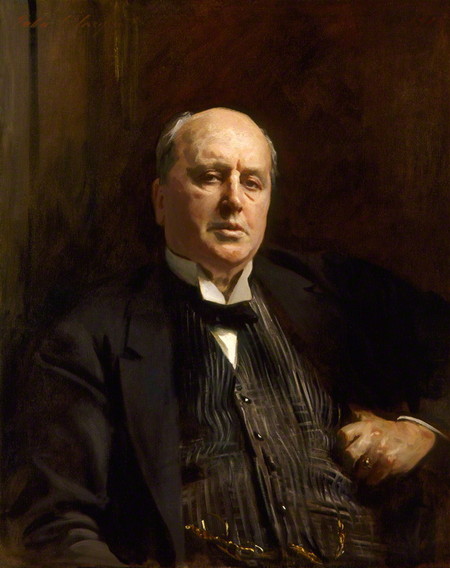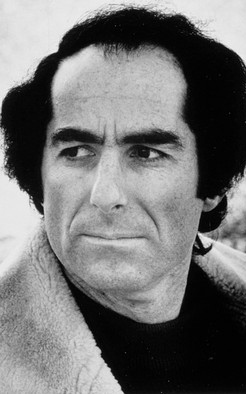Impossible Dreams: Henry James and Philip Roth
At the age of 50, Henry James created a detailed portrait of an experimental novelist in old age, in his story "The Middle Years." Terminally ill, the novelist Dencombe receives in the mail the published version of what he realizes will be his final work, a novel titled The Middle Years. As he reviews it, he realizes that it is "extraordinarily good," but he fears that this will not be perceived by others. The book was a culmination, "somehow a result beyond his conscious intention: as if he had planted his genius, had trusted his method, and they had grown up and flowered." With this recognition, however, came the painful realization of how slowly his skill had grown: "His development had been abnormally slow, almost grotesquely gradual...[H]e had for long periods only groped his way. It had taken too much of his life to produce too little of his art."
 |
|
Image courtesy of the National Portrait Gallery, Washington, DC. |
Dencombe - like James - is thoroughly experimental: "a passionate corrector, a fingerer of style; the last thing he ever arrived at was a final form for himself." He was a late bloomer, who "had ripened too late and was so clumsily constituted that he had had to teach himself by mistakes." Tantalized by the false hope that he might overcome his illness, Dencombe wishes for a reprieve, the opportunity to work in a "splendid 'last manner,' the very citadel...of his reputation, the stronghold into which his real treasure would be gathered."
As Dencombe dies, however, he accepts the inevitability of incompleteness and uncertainty: "We work in the dark - we do what we can - we give what we have. Our doubt is our passion and our passion is our task. The rest is the madness of art." The persistence of a young admirer finally prompts Dencombe grudgingly to acknowledge that "We've done something or other." James thus allowed his fictional self to concede that artistic achievement can be real even if it falls short of perfection.
 |
|
|
At 46, Philip Roth published The Ghost Writer, which parallels "The Middle Years" in presenting a portrait of a great fictional experimental writer by a real one. Roth has consistently argued that literature should not teach lessons; he begins his novels without plans or outlines; discovers his themes in the act of writing; and vehemently rejects the idea that creation is epiphany (he once declared that "Writing isn't hard work, it's a nightmare...There's a tremendous uncertainty that's built into the profession.").
Roth is a quintessential example of an experimental innovator whose contribution is embodied in an excellent body of work rather than in any individual masterpiece. In 2006, when the New York Times asked several hundred editors, critics, and writers to name the single best work of American fiction published in the past 25 years, Roth's American Pastoral placed fifth, behind novels by Toni Morrison, Don DeLillo, John Updike, and Cormac McCarthy. Yet no less than six other novels by Roth also received votes, prompting A.O. Scott to observe that if the poll had asked for the best writer of fiction in the past 25 years, Roth would have won. American Pastoral was written when Roth was 64; the other six of his novels that received votes spanned 18 years, from ages 53 to 71. Considering the results, Claudia Pierpont observed that "Not since Henry James, it seems to me, has an American novelist worked at such a sustained pitch of concentration and achievement, book after book after book."
In The Ghost Writer, the reclusive, elderly E.J. Lonoff described his enterprise bleakly to a young admirer: "I turn sentences around. That's my life. I write a sentence and then I turn it around. Then I look at it and I turn it around again...And I ask myself, Why is there no way but this to fill my hours?" When his assistant finds among his papers 27 drafts of a single short story, his reaction is, "To get it wrong, so many times." Beside his writing desk, Lonoff has pinned up an index card with three typed sentences: "We work in the dark - we do what we can - we give what we have. Our doubt is our passion and our passion is our task. The rest is the madness of art."
Roth explained that Lonoff lived in "isolation, loneliness, solitude - all the writer's occupational hazards...He maintains a sense of artistic purity - but at tremendous expense." Henry James had been an example of artistic integrity for Roth early in his career, and James' fictional version of the doubting writer in old age remained a model for him when he created his own fictional doubting writer. In the end, however, it seems that the examples of James and Dencombe were not enough to sustain Roth, who found the anxiety of writing such a burden that he experienced enormous relief when he announced his decision to retire as a novelist.
To follow what's new on Facts & Arts, please click here.
For links to Amazon for David Galenson's books, please click picture below.





















